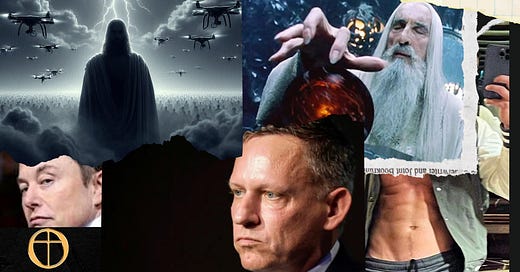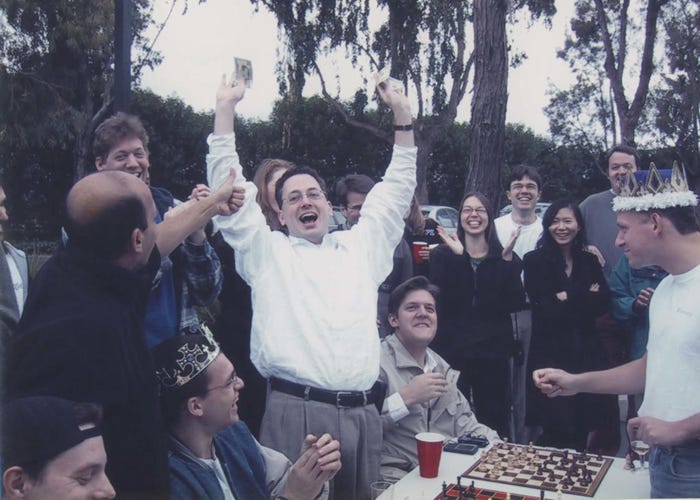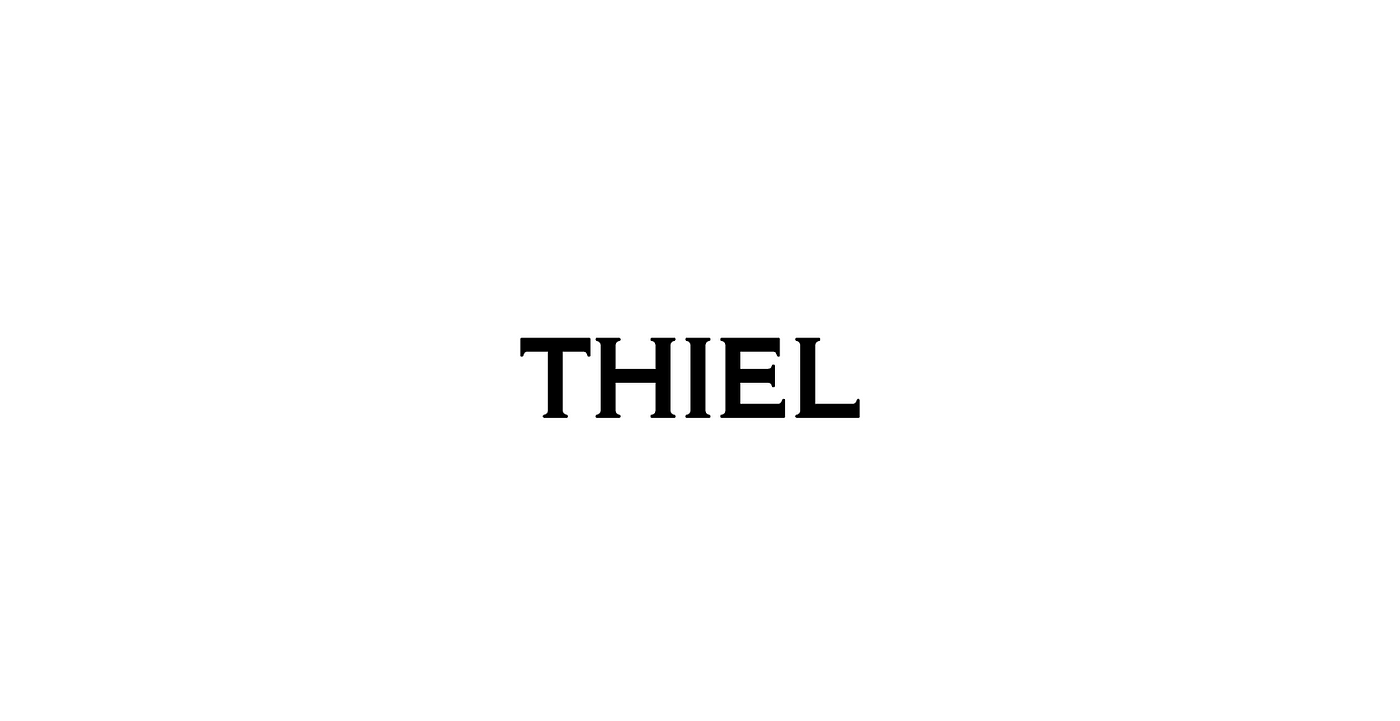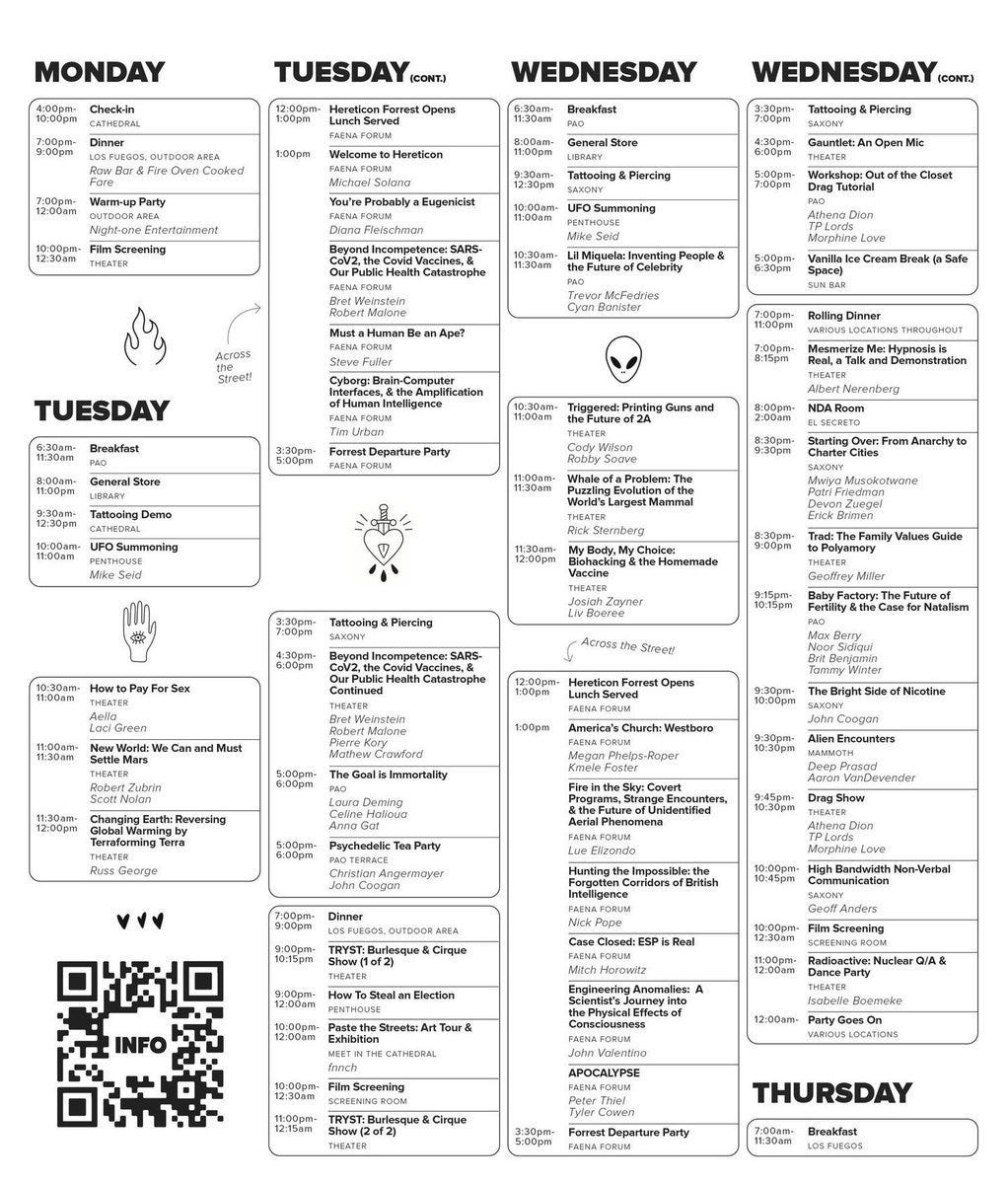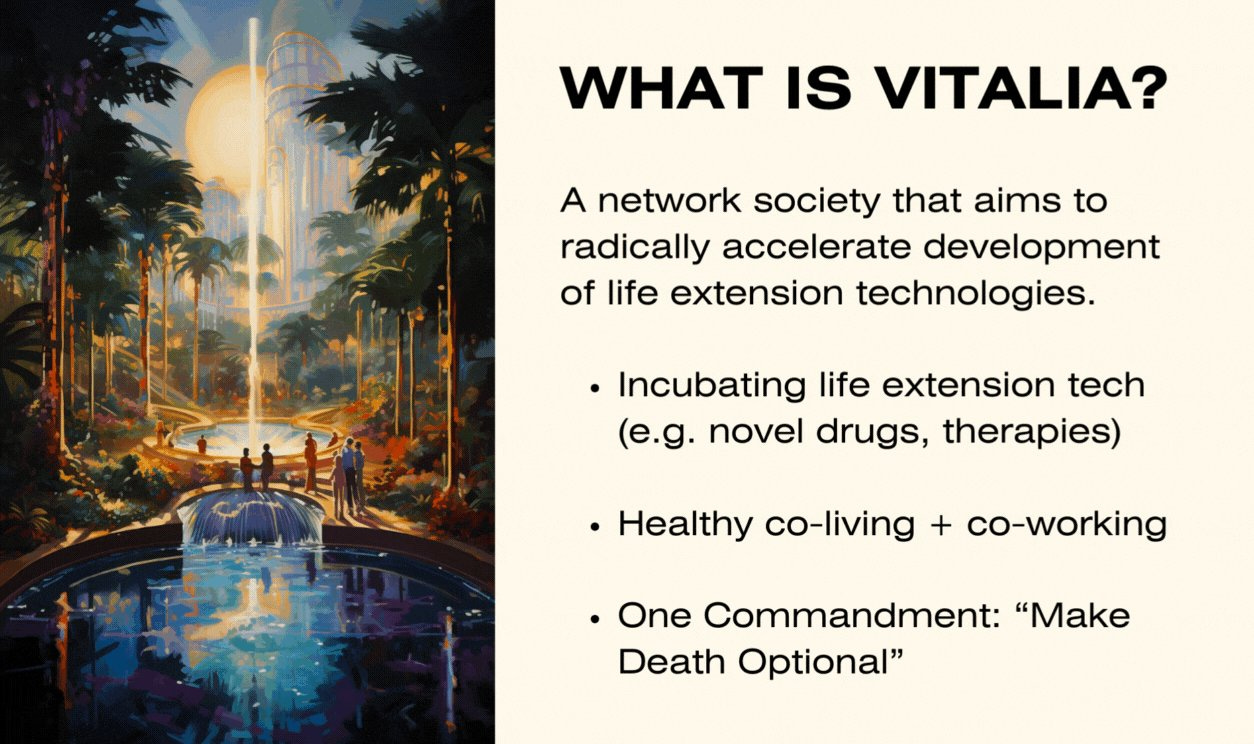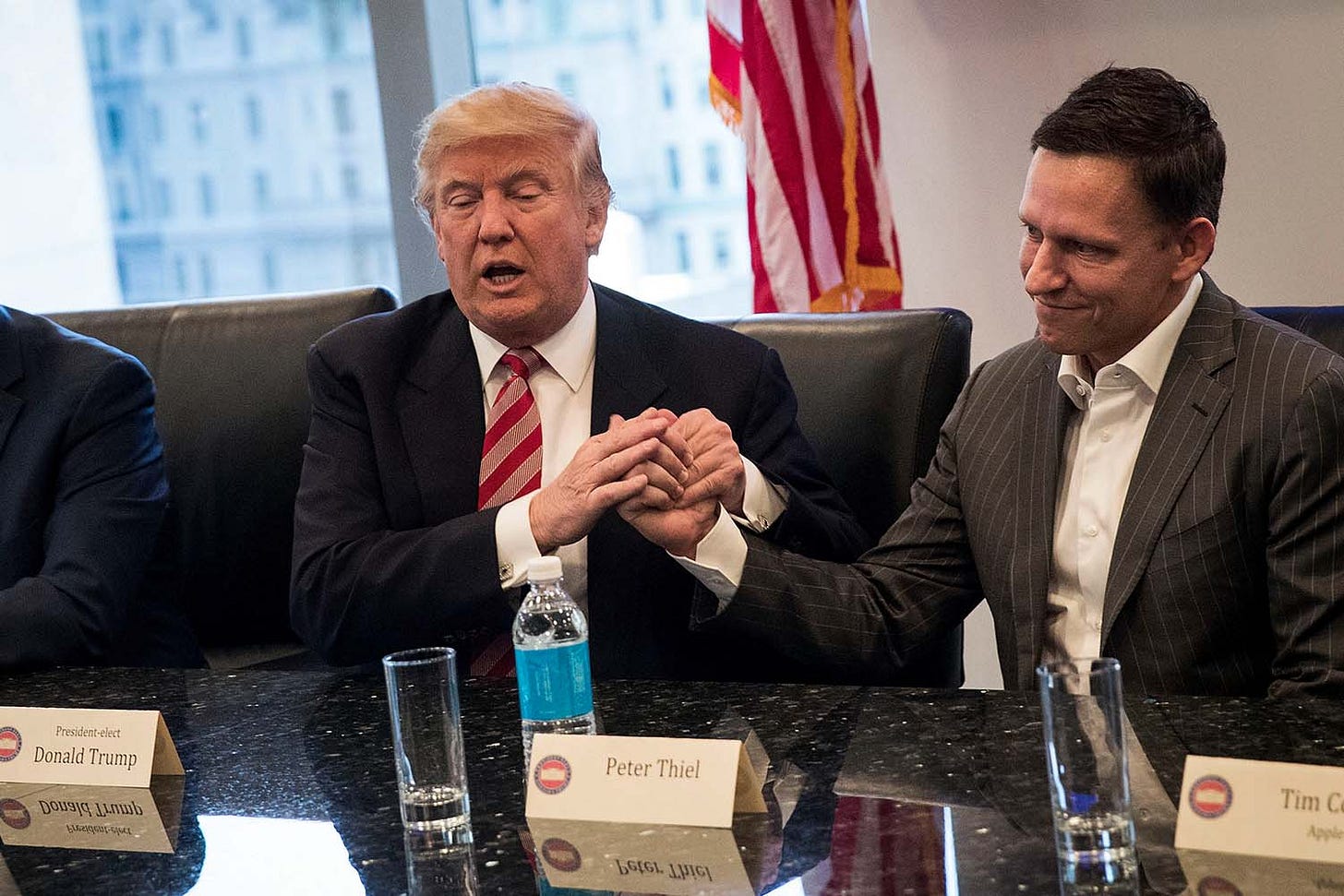Peter Thiel is betting on the apocalypse
An emerging alliance between Tech, the Pentagon and the Christian Right
American investor Peter Thiel is involved in several of the intellectual currents I cover - transhumanism and the new eugenics, psychedelics and the FDA, and the rise of the Tech Right. Here’s a deep dive into his life and work, looking particularly at a new emerging pact between the Christian Right, Silicon Valley, and the Pentagon. I’ll end with some thoughts on the defence crisis facing the UK and EU now.
This moment may be Peak Thiel. Think of it: a former employee of one of his funds is currently vice-president of the United States, having been hand-picked for the job by Thiel. A former business partner of Thiel’s, Elon Musk, runs DOGE (not officially but actually). A former college buddy and employee, David Sacks, is Trump’s AI and crypto czar, overseeing government’s AI policy and new federal crypto reserve. A former Thiel Foundation employee, Jim O’Neill, is nominee for deputy secretary of Health and Human Services. Companies Thiel invested in or run by former business partners control the world’s biggest social media - Facebook, Whats App, Instagram, X, YouTube, LinkedIn. We are all in Thiel’s world, following ideas and which he seeded many years ago. The idea that the US should be run like a corporation by an authoritarian CEO-figure? That comes from Curtis Yarvin, a fringe far-right thinker who Peter Thiel funded over a decade ago.
For a very private person, Thiel has never been more in the public eye. Some Germans even made a James Bond song about him as a super-villain. He may even be over-discussed at the moment, but seeing as I’ve recently written long profiles of Nick Land’s amphetamine-fuelled accelerationism and Elon Musk’s ketamine-fuelled social media addiction (one impulsive tweet just cost him $7 billion, by the by), I thought I’d write a profile of Thiel, how he intersects with interesting / weird ideas-currents, and how a new alliance could be emerging between the Christian Right, Silicon Valley, and the US military-industrial complex.
This is what we’ll cover:
1: DEI must DIE (Thiel’s experience at Stanford)
2: Move Fast and Break Things (Thiel’s experience at PayPal and then Founders Fund)
3. Heretic (Thiel’s role as patron prince for a vast court of rightist ideas)
4. Shadow-president (Thiel’s role in shaping the first and second Trump governments)
5. The Priest, the General, the Millionaire (the new alliance between the US Christian Right, the Tech Right, and the Pentagon)
Part One: DEI must DIE
Peter was born in 1967 in West Germany. His father was a chemical engineer who moved the family to Ohio when he was one. Peter then spent some of his childhood in South Africa before going to elementary school in California. School-mates say he was quite solitary, aloof and intellectually arrogant. He was into Dungeons & Dragons and Lord of the Rings (he claims to know it by memory and many of his companies have Tolkien-inspired names). He was also gay and in the closet. One moment from his childhood that seems to have left a mark was when he saw an animal skin rug and asked his father what happened to the animal. ‘It died, like we all have to do’ said the father. This horrified young Peter.
He went to Stanford University to study philosophy in 1985, just as the university was adapting to multiculturalism and there was a lot of left-wing student activism. He, by contrast, found himself connected to and cultivated by right-wing networks. He was befriended by Arne Panula, a priest who ran Opus Dei’s centre in Stanford to recruit talented young men into its ranks. Opus Dei is a Spanish Catholic right-wing cult that recruits male members at universities around the world, collects vasts amount of money from them when they’re wealthy, then uses it to support hard-right political causes around the world.
In 1987, at the height of the multiculturalism protests, Thiel started the Stanford Review, a right-wing libertarian student magazine. It argued against diversity policies like affirmative action, for free speech, for the western canon, and against administrative bloat and left-wing bias in academia. He must have seemed like a loathsome Nazi to his fellow leftie students, but he found allies, like Keith Rabois, David Sacks and Joe Lonsdale, all of whom worked at the Stanford Review and would go on to work at Thiel’s companies.
After Stanford, Thiel went to work at Credit Suisse and then a big law firm, but he was never going to be a corporate man. He and David Sacks published a controversial hard-right book in 1995, The Diversity Myth. It laid out the critique of Wokeness that we now hear Musk and others parrot every day - multiculturalism (wokeness in today’s parlance) is a disease that will destroy western civilization; it destroys the ideal of universalism in favour of particularism (identity politics or ‘positionality’); it destroys the truly great achievements of western culture in favour of dubious movements like ‘Afrocentrism’; it makes a virtue out of florid victimhood (intersectionality) for minorities, and this victim identity always depends on an oppressor, so it needs to constantly ferret out new outrageous incidents of racism or sexism or homophobia. The monsters who are guilty of these crimes must be exposed, and either forced to confess their guilt or cast out of the body-politic.
The authors were shocked by Stanford student's’ protests against its Western Culture course, in favour of more black, hispanic, gay, female and non-western authors (much like the student protests that occurred in the Black Lives Matter movement). They were particularly struck by one student chant: ‘Hey hey ho ho Western Culture’s Gotta Go’.
This collective outpouring of anger, both spontaneous and intense, was reminiscent of protests in Teheran or Tripoli; however, the implausible source of these sentiments was not a mob of Islamic fundamentalists, but some of America's best and brightest students at a bucolic college campus, near sunny Palo Alto, California, an affluent suburban community.
Two of their friends played a provocative prank. There was an upcoming debate ‘Was Beethoven black?’ In an early example of alt-right shit-posting, they coloured in the poster and gave Beethoven an afro. This provoked outrage in the mainly-black dormitory where the two white students lived: .
As many as 60 students were crying with various degrees of hysteria. At least one student hyperventilated and had to be assisted in breathing. According to R/F Brooks there was “utter chaos.” People were “crying, screaming,” “hysterical” and “distraught.” R/F Weiss said that there was “mass chaos,” “people were holding hands and crying, tears were running down,” the “staff was running around trying to collect people.” R/ F Brooks told the staff “to make sure no one was alone.” R/A Johnson reported that “one woman was jumping up and down saying this is not fair.”
The two students responsible were identified and surrounded by other students and threatened with a beating unless they confess and atone, rather like students in 2020 demanding people ‘take the knee’ or ‘admit to systemic racism’. Thiel and Sacks wrote: ‘the group attack eerily recalled the scapegoating of witches in Salem or the collective catharsis achieved during George Orwell’s “Minute of Hate” in 1984.’
At Stanford, Thiel was a student of French Christian philosopher Rene Girard, and he came to see human society through the lens of Girard’s philosophy. Humans, Girard believed, have a profound propensity for violence, which comes from our natural instinct to emulate and compete with each other. This mimetic tendency builds up envy and resentment, until the emotion must have an outlet in violence and revenge. It seeks an outlet - the scapegoat - whose violent murder purges the tribe, briefly, of its disturbing feelings of emulation. Girard thought Christianity a divine intervention, in that Jesus Christ took on the role of scapegoat for all time, while also teaching humanity a new ethic of forgiveness and mercy. The problem was that Christianity was in decline and being replaced by the faux-religion of political correctness, in which there is no transcendent symbolic scapegoat, just an endless parade of actual scapegoats who must be lined up and executed (literally or figuratively) over and over and over in an endless purge. Thiel and Sacks saw this as a new authoritarianism:
In seeking to impose egalitarianism, they made themselves an elite. In seeking to eliminate what they perceived as oppression, they acted far more tyrannically. In enacting new codes of conduct and creating new-age crimes, they exempted themselves from common standards of decency.
Part Two: Move Fast and Break Things
Thiel left his New York law firm, moved back to California, and started Thiel Capital Management in 1996. In 1998, he co-founded PayPal with Luke Nosek. It aimed to be an electronic payments system which could ultimately free individuals and organisatons from the tyranny of national banking systems (and tax systems) much as cryptocurrency would in later years. Thiel assembled and ruled over an extraordinary court of talent at PayPal - now famous as the ‘PayPal Mafia’. They included:
Elon Musk, whose own online payment firm X merged with PayPal
Reid Hoffman, who went on to found LinkedIn
David Sacks, a crypto investor and now Trump’s chief AI and crypto advisor
Steve Chen, Chad Hurley and Jawed Karim, who went on to found YouTube
Jeremy Stoppelman and Russel Simmons, who went on to found Yelp
And so on. It was a remarkable collection of talent, and Thiel was acknowledged as the smartest of them - he used to play the other staff in simultaneous chess and only lost once (to David Sacks).
PayPal developed a particular highly aggressive strategy for gaining market share, nicknamed Blitzscaling. In the early days of a start-up, accelerate extremely hard, grab market share however you can, even if you have to slash prices or bend or break legal rules - you can apologise later on and raise prices once you’ve established dominance or, preferably, a monopoly. Move fast and break things, as Thiel’s protege Mark Zuckerberg put it at Facebook. It was a strategy followed by countless other start-ups in years to come, from Stripe to Uber.
Despite their common roots in South Africa, Thiel and Elon Musk made for awkward colleagues and Musk didn’t stay at PayPal for long. They had different styles of investing and living - while Thiel always hedged his bets and backed multiple projects, Musk tended to go all-in on one project and see it as an engineering (rather than an investing) challenge. He had a much higher appetite for risk - he once took Thiel out for a spin in his new sportscar, and crashed it. Thiel thought he was reckless and a braggart. Musk once said:
Peter’s philosophy is pretty odd. It’s not normal. He’s a contrarian from an investing standpoint and thinks a lot about the singularity. I’m much less excited about that. I’m pro-human.
Thiel sold PayPal to eBay for $1.5 billion in 2002, and set up Clarium Capital, a venture capital fund with a distinctively right-wing culture - it employed some of his old Stanford Review buddies, like Joe Lonsdale. In 2005, he founded the Founders Fund. He’s been an early investor in some of the best start-ups of the last 20 years: SpaceX (although he passed on Tesla); AirBnB, Spotify, Stripe, Yelp, Asana and OpenAI. His most famous investment is the $500,000 he invested into Facebook, as its first external investor. Thiel said he was inspired to invest in Facebook because of his study of Rene Girard, and his understanding of humans’ compulsion to imitate and emulate each other. In Girard’s philosophy, this compulsion is also an urge to violence, so Facebook could be said to be a global amplifier of memetic violence.
Despite his investment in some of the world’s biggest social media companies, Thiel has been dismissive of them as breakthrough technologies - he sees them as a distraction from technological stagnation. When he was asked to give a speech at one of Facebook’s annual employee gatherings, he said ‘we were promised flying cars. We got Facebook.’
In a world of ever-increasing online sharing, he is himself extremely private, and doesn’t have an account on any social media. This is his website - it’s just this page.
His extreme personal privacy is perhaps a result of being in the closet as a homosexual until he came out at the Republican Convention in 2016. Before then, the magazine Gawker published articles insinuating he was gay - as all of Silicon Valley knew. He took this personally and funded a libel law-suit by Hulk Hogan against the magazine, which ultimately bankrupted it.
Despite this heavily-policed privacy, the media very occasionally publishes details of his personal life, and the coterie of beautiful young men who seem always to surround him and work for him. For some years, he had a husband in Miami (Matt Danzeisen) and a lover in Los Angeles (male model Jeff Thomas), who were kept completely separate, with friends having to choose which social circle they would like to belong to. On New Years’ Eve 2022, Jeff Thomas fatefully showed up at Thiel and Danzeisen’s party in their Miami mansion. There was apparently a major scene, and Danzeisen reportedly insisted Thomas be escorted from the premises by security. Three months later, Jeff Thomas fell from his apartment balcony and died, in what police were apparently investigating as a suicide. Nothing has been reported on this since.
Part Three: Heretic
Thiel takes a venture capitalist approach to ideas, making bets on a wide range of contrarian thinkers. Like his ex-colleague Reid Hoffman, he’s made fashionable the idea of the Silicon Valley philosopher. But does he really have a coherent philosophy?
Tara Isabella Burton has defined Thielism as ‘the idea that human progress is driven by the creativity and bravery of a few and stymied by ossified ways of doing things’. He often talks about how we’ve been in a period of technological stagnation since the 1960s. And he co-wrote a book praising founders as these heroic wizards who create something from nothing. Long before Marc Andreesen published his Techno-Optimist Manifesto, Thiel’s Founders Fund published a Manifesto for the Future. But really, Thiel pays others to think for him. He is a patron of ideas and has created a vast network of influence across Silicon Valley, the US and the world, much as Sir Paul Marshall is now trying to do in the UK.
One aspect of this patronage is the Thiel fellowships - an idea to pay promising undergraduates $100,000 to drop out of college and try to start a business. Over 260 people have been awarded Thiel fellowships in the last 13 years. Then there are Thiel-funded conferences like Dialog or Hereticon (below is the schedule for the 2022 event), where Diana Fleishchman spoke on ‘you’re probably a eugenicist’ and Aella on ‘how to pay for sex’.
He funded Eliezer Yudkowsky’s Machine Intelligence Research Institute, although he’s come to think it’s too risk-averse about AI. And he’s funded Intellectual Dark Web thinkers like Eric Weinstein (who works for Thiel Capital) and Clare Lehmann, founder of Quillette.
Many of the ideas he backs could be called libertarian. When he talks about the apocalypse, as he does occasionally, he imagines all human minds melding into one sort of borg group-mind, in which it’s impossible to think individual thoughts - it’s the sort of nightmare dystopian version of the sci-fi fantasies of Olaf Stapledon and Arthur C. Clarke. The antidote to this collectivist hell is strong individuals capable of contrarian thinking.
One of his favourite books is a 1997 work by James Dale Davidson and William Rees-Mogg, called The Sovereign Individual: Mastering the Transition to the Information Age. He wrote the preface for a new edition of it. The authors argue that the key to understanding history is violence, and the organisation of violence. Nation-states emerged as monopolies on violence, and they used that monopoly to take money from citizens and use it to fund themselves, mainly for wars. In the information age, however, the wealthy can use digital currency to avoid state violence (ie taxation) and to create their own mini-monopolies on violence.
The Sovereign Individual is an extremely libertarian and elitist book. The authors follow Pareto’s law, that almost all wealth and innovation come from 20% of society — what Pareto called ‘the vital few’. There is a ‘cognitive elite’ who are far smarter and far richer than everyone else. They write:
The Sovereign Individuals of the Information Age, like the gods of ancient and primitive myths, will in due course enjoy a kind of “diplomatic immunity” from most of the political woes that have beset mortal human beings in most times and places.
Anyone who earns less than $200,000 a year ($330,000 in today’s money) is a ‘loser’, and they will suffer. Nation-states are destined to fail — their currencies will become more and more inflated, while the cognitive elite leave them behind and go and live in tax shelters, or start up their own mini-countries run like corporations.
Thiel has been looking for a way to do that for years. In 2008, he provided seed capital to The Seasteading Institute, a non-profit started by Patri Friedman, the wayward grandson of neoliberal economist Milton Friedman. It explored how to start up libertarian floating cities, but eventually sunk without trace. More recently, Friedman helped set up Pronomos Capital, once again with Thiel seed funding. Pronomos invested in a libertarian free economic zone on an island off Honduras, called Prospera (this project is also in serious trouble). Prospera has a transhumanist hub in it called Vitalia, where sovereign citizens pursue their dream of immortality through genetic biohacking experiments forbidden on US soil.
This is another of the principal themes in Thiel’s intellectual portfolio - transhumanism. He thinks biotechnology is still a frontier where there could still be radical progress of the sort humans experienced between 1700 and 1900. He’s interested in the new liberal eugenics - not through top-down authoritarian rules on who can and can’t breed, but rather new genetic editing technologies which the rich can use for themselves and their children / embryos. He invested in a start-up called Orchid, founded by Thiel fellow Noor Siddiqui, which enables parents to select embryos based on their polygenic scores. He’s also employed Simone Collins - she and her husband Malcolm are the first couple to publicly admit to using embryo selection to choose a more advanced embryo. Malcolm’s brother Miles runs a fertility clinic and now works for DOGE.
Another of Thiel’s transhumanist projects is the Enhanced Games, a strange venture launched by gay transhumanist German biotech investor Christian Angermeyer and an Australian entrepreneur called Aron De Souza, who is part of Thiel’s gay VC party scene. Aron told The Spectator: ‘Before Peter had kids, we’d go on these holidays around the world. Small group of us. Gay, tech, venture capital, founder-types. It’s quite a close-knit little community.” It was at one such party on Thiel’s Miami island mansion that they came up with the idea of the Enhanced Games, which seems to be a sort of Gay Transhumanist Olympics on Steroids. It was scheduled for 2024, now late 2025 or maybe 2026…
Thiel has also invested in two of Christian Angermeyer’s psychedelic start-ups - Compass Pathways and Atai. Angermeyer has written often about the ‘next human agenda’ - how humans will become enhanced into superhumans through technologies like genetic editing, psychedelics, and even dieting drugs like Ozempic. It’s not clear, however, if Thiel still invests in psychedelics, and whenever Thiel has ever mentioned psychedelics publicly, it’s to criticize them. In a National Review essay, he suggested American decline started at Woodstock. “This was when hippies took over the country. And when the true culture war over Progress was lost.” In The Diversity Myth, he recalls Timothy Leary coming to talk to Stanford students when he was there, and preaching neo-shamanic gibberish to the students.
In 2022, he suggested psychedelics are part of an excessive focus on inner states, at the cost of external technological progress: “We’ve been distracted from the lack of progress” by “the shift from exteriority, from measurable things” such as “faster speeds, supersonic airplanes or longer life expectancies” and re-oriented on “the interior world of yoga, meditation, psychology, parapsychology, psychopharmacology, psychedelic drugs, video games, the internet et cetera”. On the Joe Rogan podcast last year, he suggested ancient psychedelic rituals were probably very violent (think of the Incas, who murdered children on ayahuasca).
He’s sometimes defined himself in opposition to psychedelic icons. He suggested Alexandra Wolfe (Tom Wolfe’s daughter) write a sort of anti-Electric Kool Aid Acid Test, with Thiel as the Anti-Kesey, driving a bus around the US, persuading students to drop out from college and launch their own start-up (the idea became her book Valley of the Gods). When he gave a university commencement speech in 2016, he consciously framed it as a counter to Steve Jobs’ famous Stanford commencement speech. Where Jobs said you should live each day like it was your last, Thiel suggested you should live each day like you’re going to live forever.
Which he intends to do. He has been one of the earliest and most active investors in longevity and immortality science, funding an institute called SENS Research Foundation dedicated to discovering the key to eternal life, which was run by scientist Aubrey De Grey and Thiel associate Jim O’Neill (who is now nominated to be deputy secretary of Health and Human Services). Thiel has also backed Halcyon Molecular, a genetic start-up aiming to halt ageing, he’s given $1 million to the Singularity Institute, a non-profit trying to download our consciousness into computers, and he’s signed up to the Alcor Life Extension Foundation to freeze his body when he dies in case it can be revived in a more advanced future. He’s even allegedly explored the anti-ageing powers of injecting himself with the blood of young people - ‘I’m not a vampire’, he assured one conference when asked about this.
Despite this transhumanist freakery, Thiel considers himself a Christian, and a conservative Lutheran Evangelical to boot. He doesn’t see transhumanism and Christianity as in opposition, as most Christians would. Rather, he’s in the tradition of Russian Cosmist thinkers like Nikolai Fedorov, who thought the true gospel brought by Christ was that we should strive for physical immortality, achieved by science. He told the theologian NT Wright:
The one part of the Christian view that I believe more strongly than anything is that death is evil, that it’s wrong and we should not accept it and fight it anyway we can…I don’t think there’s anything incompatible with indefinite life extension and Christianity.
Nor does he see any necessary conflict between Christianity and his celebration of technological progress. He is a Christian in the Francis Bacon mould - scientific and business innovation is a gift of the Holy Spirit, which gradually remakes this fallen creation and brings us closer to God.
Finally, Thiel supports contrarian and sometimes illiberal or anti-liberal thinkers on the right, most famously Curtis Yarvin / Mencius Moldbug, whose start-up Tlon was seed-funded by Thiel. Yarvin is the main figure in the Neo-Reactionary movement, and has for two decades argued that mass welfare multicultural democracy is doomed, it’s just being propped up by a forced consensus of the zombie liberal status quo which Yarvin calls ‘the cathedral’. The only viable solution is the establishment of new corporate states run by CEOs like businesses.
Thiel thinks companies should be run as autocracies by their genius-founders, rather than by committee or shareholder vote. There is a Silicon Valley great man theory of history and a worship of morally-ambivalent superman figures - Augustus Caesar, Napoleon, John Von Neumann, Elon Musk, Bismarck, even LBJ. This great-man worship paved the way for big tech’s support for Trump, which Thiel spearheaded in 2016.
Part Four: Shadow President
In 2009, during the Obama presidency, Thiel famously wrote: ‘I no longer believe that freedom and democracy are compatible’. He continued:
The 1920s were the last decade in American history in which one could be genuinely optimistic about politics. Since 1920, the vast increase in welfare beneficiaries and the extension of the franchise to women—two constituencies that are notoriously tough for libertarians—have rendered the notion of a capitalist democracy an oxymoron.
It was a glimpse into quite how reactionary and far-right his politics can be - true capitalist freedom is threatened by the welfare state and women voters! He thought freedom might still be possible on the internet, in space, and on islands. In 2011, he bought citizenship to New Zealand and apparently constructed a bunker there to see out the apocalypse.
And yet Thiel is always one to hedge his bets. His 2008 letter to Clarium investors declared “a bull market in politics,” which would be characterized by a breakdown of the consensus of the “globalist elite.” He started to make bets on a new more right-wing populist anti-immigrant and nativist counter-elite, of the sort we now see in power. Long before Elon Musk supported Tommy Robinson or the AfD, Thiel was backing figures like Kris Kobach, who’d served as a lawyer for an anti-immigration group, the Federation for American Immigration Reform, or meeting with white supremacists like Kevin DeAnna.
In 2016, he donated to Donald Trump’s outsider campaign, and spoke at the Republican Convention - the first openly gay man to do so. At the time, Silicon Valley was very Democrat-leaning, both in its employees and CEOs and founders. He did not apparently expect Trump to win and watched in giddy amazement, Curtis Yarvin by his side, when he did. His court of Thielians took to calling him the ‘shadow president’. For a while, he enjoyed enviable access to President Trump’s inner circle. He organized the meeting of Trump with most of the leading figures from technology (Musk came away thinking Trump was a moron).
Thiel was given a role in Trump’s 2017 White House - Trump’s chief of staff, Steve Bannon, tasked him with taking on the bloated bureaucracy and especially the alphabet soup of agencies - FDA, CDC, and so on, similar to Musk’s efforts now with DOGE, albeit with less of a chainsaw. Thiel tried to appoint contrarians and libertarians to various positions, to counter-act the consensus thinking of ‘the blob’ and even perhaps dissolve whole agencies. He suggested Balaji Srinivasan as head of the FDA - Srinivasan suggested new drugs could be approved through a website of user reviews, like Erowid. Almost all of Thiel’s suggestions were blocked - they were too extreme even for Steve Bannon (he suggested a climate change denier should be Trump’s chief scientific advisor).
Thielians felt that Trump’s radical instincts were being curbed by the ‘swamp centrists’ around him. Thiel slowly distanced himself from Trump, recognizing perhaps that, according to the philosophy of Rene Girard, the king becomes a scapegoat whose sacrificial death purges society of its discontent. But he continued to make bets on political outsiders - he supported his friend Blake Masters’ run for Congress (it failed), and employee JD Vance’s run for the Senate (it succeeded).
Vance has long been an acolyte and admirer of Thiel’s. He credits a speech Thiel gave at Yale Law School in 2011 as a key moment in his slow conversion to right-wing Christianity. Vance later worked for Thiel’s Mithril Capital, then persuaded Thiel to invest in his own Narya Capital (always wise to name your start-up after something from Lord of the Rings). In 2021, Thiel introduced Vance to Trump at Mar-a-Lago. In 2022, Thiel put $15 million into Vance’s campaign for the Senate. Then, in 2024, Thiel’s friend David Sacks organized a $300,000-per-ticket fund-raiser for Trump at his mansion, and at the event Q&A he suggested to Trump that Vance should be his VP nomination. In the run-up to the Republican Convention, Thiel, Sacks and Elon Musk all phoned Trump to push for Vance. They got their way.
After a slow start in the campaign, Vance has emerged as a strong-albeit-polarising figure, far more visible in the first two months of Trump’s presidency than most vice-presidents. He’s become something like Trump’s mini-me, bullying visiting European leaders with aggressive questioning, and getting in Twitter fights with everyone from Niall Ferguson to Rory Stewart. Other Thiel-connected appointees or nominees in the new government include David Sacks, who as Trump’s AI and crypto czar pushed for a crypto federal reserve fund, and Jim O’Neill, who as deputy secretary of Health and Human Services under RFK may try to liberalize the FDA’s drug approval process. And of course, former PayPal colleague Elon Musk has an incredibly visible role in the new government. DOGE (whose staff includes various young Thielians) is trying to shake up the administration, slash spending and dissolve whole agencies. It’s now taking on Pentagon spending, in a shake-up which could create big opportunities for two of Thiel’s start-ups - Anduril and Palantir.
Part 4: The Holy Surveillance State
Keep reading with a 7-day free trial
Subscribe to Ecstatic Integration to keep reading this post and get 7 days of free access to the full post archives.

